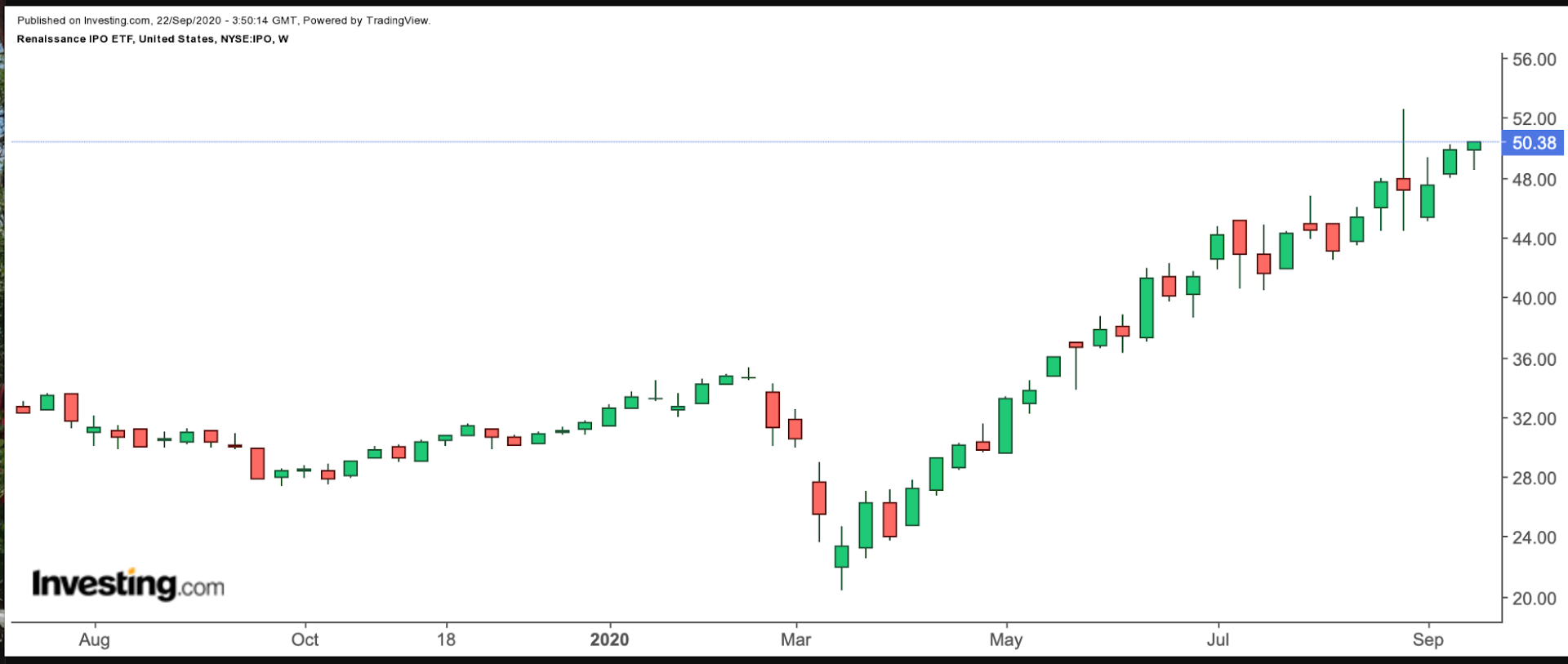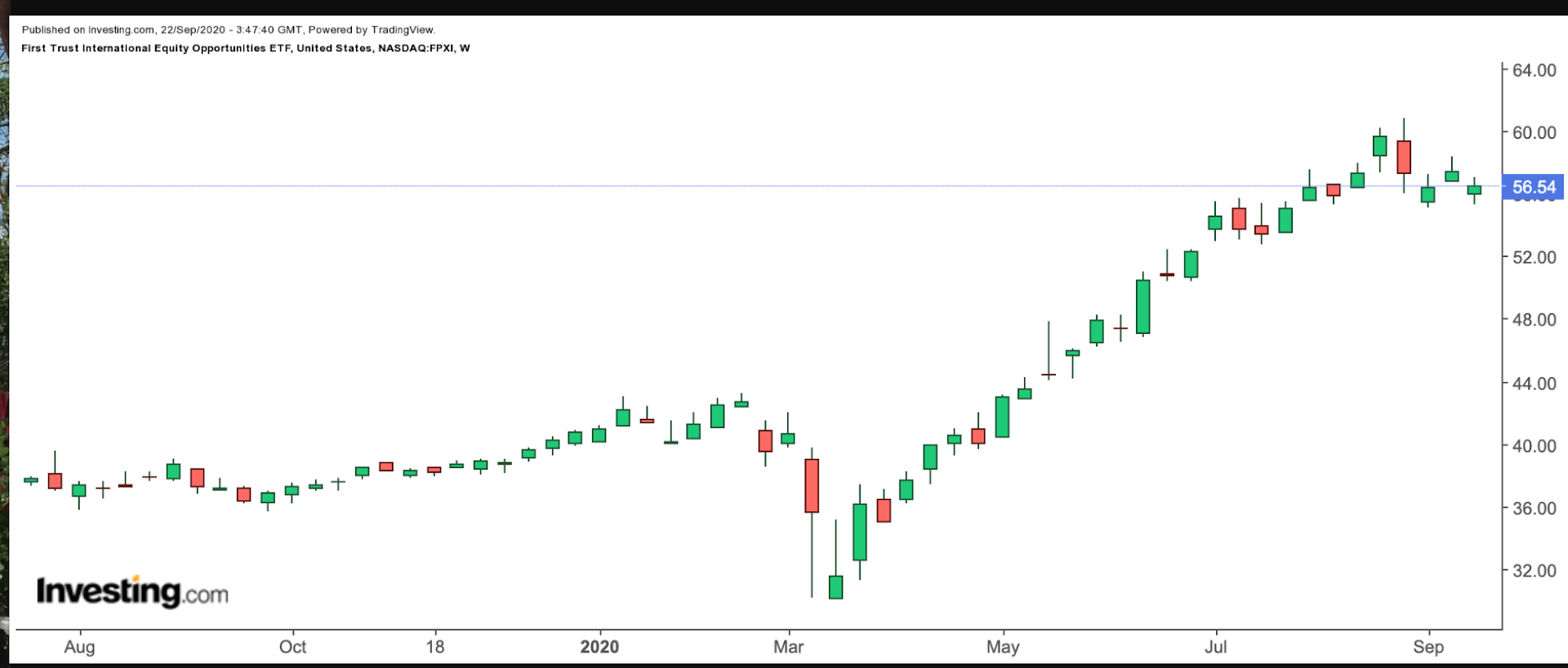Amid the recent declines in broader markets, a blockbuster stock debut has been making headlines: cloud-based data-warehousing firm Snowflake (NYSE:SNOW).
While the company priced its initial public offering (IPO) at $120 a share, the stock debut at more than double that figure, opening at $245 per share on Sept. 16. Demand was so robust the stock hit an intraday high of $319 during its first full day of trade. Though the euphoria has cooled a bit, shares of SNOW still aren't cheap. They closed yesterday at $229.
The price action generally seen during the first few weeks following an IPO may not necessarily mean a stock will have a strong track record long-term. Many factors come into play, including investors' risk appetite, which has been in abundant supply since early spring, current market dynamics notwithstanding.
Other notable IPOs of 2020 include biopharmaceutical company CureVac (NASDAQ:CVAC), DevOps provider Jfrog (NASDAQ:FROG), insurance carrier Lemonade (NYSE:LMND) and used-car e-commerce platform Vroom (NASDAQ:VRM).
The IPO calendar and market rumor mill are pointing to other eagerly-anticipated public offerings in the months ahead, such as vacation rental marketplace Airbnb, digital currency exchange Coinbase, prepared food delivery service DoorDash, data analytics software firm Palantir Technologies, financial trading app Robinhood and deep-discount, e-commerce platform Wish.
Regardless of the hype around a company, recent IPOs still have a lot to prove to shareholders and indeed momentum may be unpredictable. In addition to researching individual companies, exchange-traded funds (ETFs) can facilitate investment IPOs, while reducing the risk of owning just a single stock.
Below are 2 ETFs worth considering. Each focuses on liquid IPOs as well as spin-offs and equity carve-outs of larger companies:
1. Renaissance IPO ETF
- Current price: $50.38
- 52-week range: $20.37-$52.52
- Dividend yield: 0.26%
- Expense ratio: 0.60% per year or $60 on a $10,000 investment
The Renaissance IPO ETF (NYSE:IPO) provides exposure to a range of companies that have recently completed an initial public offering and are listed on a US exchange. IPO, which holds 43 companies, follows the Renaissance IPO index.

The index includes companies that meet various liquidity and operational screens at the end of their fifth day of trading. After 500 trading days in the public markets, the index removes them. Company reviews are conducted quarterly.
The most important sectors (by weighting) are Technology (46.1%), Healthcare (19.6%), Consumer Discretionary (16.25), Communication Services (6.2%) and Consumer Staples (5.0%%).
The top ten holdings make up slightly over 57% of total net assets, which stand at $200 million. The largest five companies include Zoom Video Communications (NASDAQ:ZM), ride-sharing app Uber (NYSE:UBER), third-party e-commerce platform Pinduoduo (NASDAQ:PDD), clinical-stage biotech Moderna (NASDAQ:MRNA) and cloud app software monitoring service Datadog (NASDAQ:DDOG).
Year-to-date, the fund is up close to 62%. The increase in shares of ZM and MRNA have played a considerable role, since their weightings are 10.6% and 6.1%, respectively. So far in the year, Zoom stock surged 588% and Moderna stock soared 254%.
In the case of profit-taking ahead in either share, IPO is also likely to drop significantly. We'd ideally wait for a potential pullback toward the $45-level or even below before investing for the long-run. The hot IPO market may need to cool down before another leg up might start in the fund.
2. First Trust International Equity Opportunities ETF
- Current Price: $56.54
- 52 Week Range: $30.13-$60.77
- Dividend Yield: 0.34%
- Expense Ratio: 0.70%
The First Trust International Equity Opportunities ETF (NASDAQ:FPXI) provides exposure to a range of non-US, liquid companies that have recently had IPOs as well as spin-offs in both emerging and developed countries. FPXI, which has 51 holdings, follows the IPOX International index.

The index includes companies that meet various investment screens at the end of their sixth day of trading and are removed after 1,000 trading days. The fund is reconstituted and rebalanced quarterly.
The top sector allocation is Consumer Discretionary (25.09%), followed by Health Care (19.66%), Information Technology (19.54%), Communication Services (11.44%), Industrials (6.17%), Utilities ( 5.53%), Consumer Staples (5.21%), Financials (4.14%) and Energy (3.22).
The largest ten holdings constitute over 38% of FPXI’s net assets, which stand around $310 million. The top five companies in the fund are online payment services facilitator Adyen (OTC:ADYEY), Chinese shopping platform Meituan Dianping (OTC:MPNGF), internet platform provider Sea (NYSE:SE), biologics technology platform provider Wuxi Biologics (HK:2269) and biotechnology firm Genmab (NASDAQ:GMAB).
In terms of country allocations, China heads the list with 30.6%. Next in line are the Netherlands (9.61%), Brazil (7.72%), Sweden (7.58%) and Denmark (7.38%).
So far this year, the fund is up over 40%. In fact, on Sept. 2, it hit an all-time high of $60.77. Long-term investors may want to research the fund further, with a view to buy on dips.
Bottom Line
In 2020, the IPO market appears to have come roaring back. Last week, Silicon Valley-based Snowflake became the largest software IPO ever. Other recently publicly-traded stocks like CVAC, MRNA and ZM have also been making the news.
Long-term investors who are interested in participating in the growth of such newly-listed companies would need to look past the current hype and study their long-run prospects.
In addition to the two exchange-traded funds discussed, there are several others that investors may want to keep on their radar screens:
